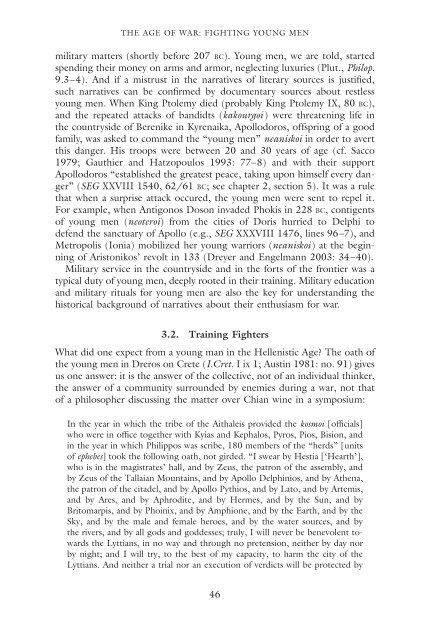WAR IN THE HELLENISTIC WORLD
WAR IN THE HELLENISTIC WORLD
WAR IN THE HELLENISTIC WORLD
You also want an ePaper? Increase the reach of your titles
YUMPU automatically turns print PDFs into web optimized ePapers that Google loves.
<strong>THE</strong> AGE OF <strong>WAR</strong>: FIGHT<strong>IN</strong>G YOUNG MEN<br />
military matters (shortly before 207 BC). Young men, we are told, started<br />
spending their money on arms and armor, neglecting luxuries (Plut., Philop.<br />
9.3–4). And if a mistrust in the narratives of literary sources is justified,<br />
such narratives can be confirmed by documentary sources about restless<br />
young men. When King Ptolemy died (probably King Ptolemy IX, 80 BC),<br />
and the repeated attacks of bandidts (kakourgoi) were threatening life in<br />
the countryside of Berenike in Kyrenaika, Apollodoros, offspring of a good<br />
family, was asked to command the “young men” neaniskoi in order to avert<br />
this danger. His troops were between 20 and 30 years of age (cf. Sacco<br />
1979; Gauthier and Hatzopoulos 1993: 77–8) and with their support<br />
Apollodoros “established the greatest peace, taking upon himself every danger”<br />
(SEG XXVIII 1540, 62/61 BC; see chapter 2, section 5). It was a rule<br />
that when a surprise attack occured, the young men were sent to repel it.<br />
For example, when Antigonos Doson invaded Phokis in 228 BC, contigents<br />
of young men (neoteroi) from the cities of Doris hurried to Delphi to<br />
defend the sanctuary of Apollo (e.g., SEG XXXVIII 1476, lines 96–7), and<br />
Metropolis (Ionia) mobilized her young warriors (neaniskoi) at the beginning<br />
of Aristonikos’ revolt in 133 (Dreyer and Engelmann 2003: 34–40).<br />
Military service in the countryside and in the forts of the frontier was a<br />
typical duty of young men, deeply rooted in their training. Military education<br />
and military rituals for young men are also the key for understanding the<br />
historical background of narratives about their enthusiasm for war.<br />
3.2. Training Fighters<br />
What did one expect from a young man in the Hellenistic Age? The oath of<br />
the young men in Dreros on Crete (I.Cret. I ix 1; Austin 1981: no. 91) gives<br />
us one answer: it is the answer of the collective, not of an individual thinker,<br />
the answer of a community surrounded by enemies during a war, not that<br />
of a philosopher discussing the matter over Chian wine in a symposium:<br />
In the year in which the tribe of the Aithaleis provided the kosmoi [officials]<br />
who were in office together with Kyias and Kephalos, Pyros, Pios, Bision, and<br />
in the year in which Philippos was scribe, 180 members of the “herds” [units<br />
of ephebes] took the following oath, not girded. “I swear by Hestia [‘Hearth’],<br />
who is in the magistrates’ hall, and by Zeus, the patron of the assembly, and<br />
by Zeus of the Tallaian Mountains, and by Apollo Delphinios, and by Athena,<br />
the patron of the citadel, and by Apollo Pythios, and by Lato, and by Artemis,<br />
and by Ares, and by Aphrodite, and by Hermes, and by the Sun, and by<br />
Britomarpis, and by Phoinix, and by Amphione, and by the Earth, and by the<br />
Sky, and by the male and female heroes, and by the water sources, and by<br />
the rivers, and by all gods and goddesses; truly, I will never be benevolent towards<br />
the Lyttians, in no way and through no pretension, neither by day nor<br />
by night; and I will try, to the best of my capacity, to harm the city of the<br />
Lyttians. And neither a trial nor an execution of verdicts will be protected by<br />
46
















